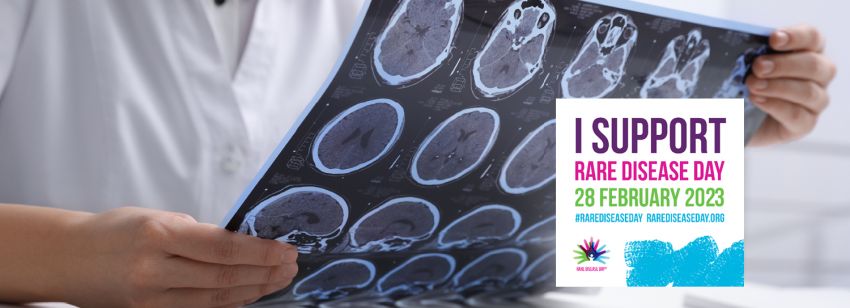Friedreich's ataxia and NMOSD
Rare neurodegenerative diseases
Neurodegenerative diseases are associated with a disorder of the central nervous system (CNS). This results in a progressive loss of function and/or failure of specific populations of neurons. In principle, neurodegenerative diseases can occur at any age. Depending on the disease, the disease progression is steady or episodic and leads to an increasing need for care, which can often result in death if left untreated. In the following, we would like to take a closer look at two of these rare neurodegenerative diseases.
Friedreich's ataxia
Friedreich's ataxia is a rare heterogeneous congenital multisystem disorder which affects both the central and peripheral nervous system, the musculoskeletal system, the myocardium, and the endocrine pancreas. Symptoms usually appear during childhood and adolescence between the ages of 5 and 15, only in some cases after the age of 25. In most cases, affected individuals experience gait ataxia with loss of lower limb reflexes and dysarthria. Gait ataxia usually occurs early in the course of the disease and, with loss of balance and trunk ataxia, results in patients being wheelchair bound at a young age. Increasing limitations in dexterity and coordination mean that everyday activities sometimes become severely impaired. Slurred speech in the early stages of the disease to incomprehensibility in the advanced stages are the consequences of dysarthria. Currently, there is no approved causal therapy for Friedreich's ataxia. Treatment is limited to symptom-oriented measures, such as physiotherapy and assistive device provision (crutches, wheelchair), as well as internistic medicine and orthopedic measures. In addition, drugs not approved for Friedreich's ataxia may be considered, but these show limited effectiveness. Due to the high therapeutic need, intensive research is being conducted to develop and clinically evaluate new drugs for the treatment of this rare disease.
Neuromyelitis optica spectrum disorders (NMOSD)
Neuromyelitis optica spectrum disorders (NMOSD) are a group of rare neurodegenerative autoimmune diseases. They are triggered by autoantibody-mediated damage of astrocytes, as a result of which nerve cells of the CNS die. As multiple sclerosis (MS), the disease occurs in relapses and has long been classified as a variant of this disease. However, patients usually do not recover from the sometimes severe and mostly unpredictable relapses, resulting in an accumulation of neurological deficits as the disease progresses. This results in an increasing degree of disability and associated limitations for the patients. Since NMOSD primarily affects the optic nerves and/or spinal cord, visual impairment, including blindness, and muscle weakness in the arms and legs often occur. Neurodegeneration can also occur in other areas of the CNS, causing various other symptoms, including the area-postrema syndrome typical of NMOSD. This manifests in persistent hiccups, nausea or vomiting. Due to the distinct diagnosis of NMOSD, many of the affected patients can achieve a mild course by means of immunosuppressive therapies, which were established in other indications but come with side effects. In the past years, these off-label therapies, are becoming supplemented by innovative drugs specifically approved for NMOSD so that patients with this rare and severe disease can be treated adequately.
Due to the legal framework created for orphan drugs, the development of new drugs in the field of rare neurodegenerative diseases increased over the last years. SKC is committed to supporting the market access of innovative drugs for patients with so far missing or insufficient therapy options and is particularly involved with rare diseases. On the occasion of the Rare Disease Day on February 28th, we would like to contribute with this article to make rare neurodegenerative diseases such as Friedreich's Ataxia or NMOSD better known.
Sources:
- Reith W. Neurodegenerative Erkrankungen. Radiologe. 2018 Mar;58(3):241-258. German. doi: 10.1007/s00117-018-0363-y. PMID: 29511772.
- Cook A, Giunti P. Friedreich's ataxia: clinical features, pathogenesis and management. Br Med Bull. 2017 Dec 1;124(1):19-30. doi: 10.1093/bmb/ldx034. PMID: 29053830; PMCID: PMC5862303.
- National Institute of Neurological Disorders and Stroke (NIH): Friedreich Ataxia. (abgerufen am 13.02.2023)
- Blaney B, Hewlett N. Dysarthria and Friedreich's ataxia: what can intelligibility assessment tell us? Int J Lang Commun Disord. 2007 Jan-Feb;42(1):19-37. doi: 10.1080/13682820600690993. PMID: 17365084.
- S1-Leitlinie Ataxien des Erwachsenenalters. Stand: 3. Juli 2018. (abgerufen am 30.01.2023)
- NEMOS - Neuromyelitis optica Studiengruppe. (abgerufen am 30.01.2023)
About the author

Market Access Manager
M.Sc. Biomedicine
Fax: +49 511 64 68 14 18


